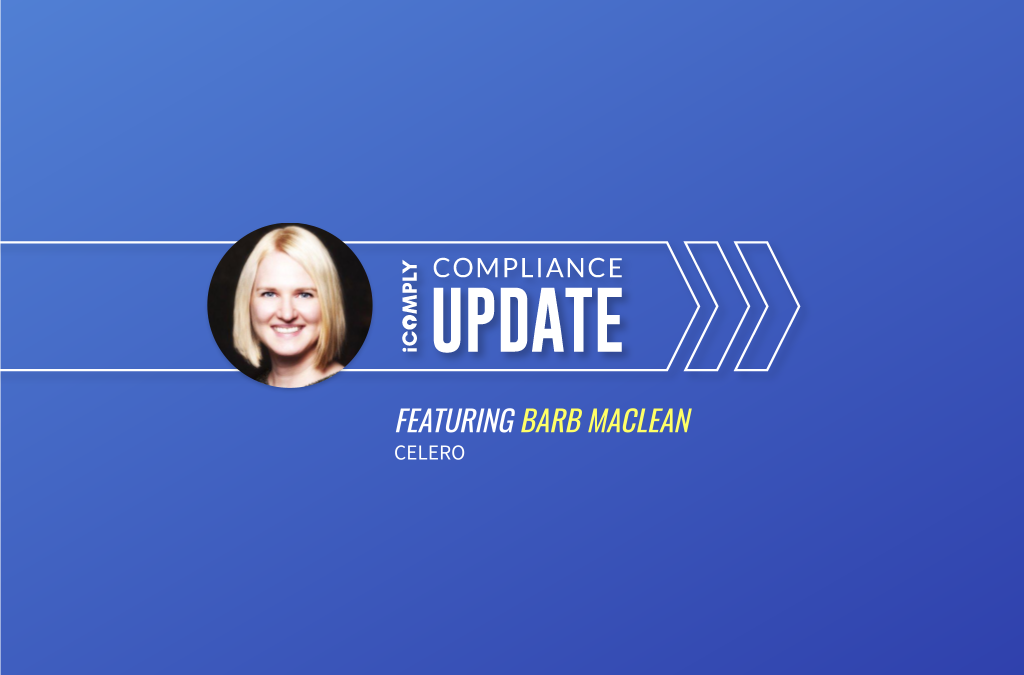Learn how to build an AML program with this step-by-step guide. Follow Mark, a UK fintech cofounder, as he creates a compliant AML framework with streamlined policies, KYB/KYC automation, and team training using iComply’s platform. Save time, reduce costs, and ensure regulatory confidence.

Ethics of AI in Facial Recognition – Credit Unions
Ethics of AI in Facial Recognition – Credit Unions
Barb MacLean, VP of Integration & Analytics at Celero, discusses the responsibility and ethical impacts of credit unions using facial recognition in their back office
What are the top challenges facing credit unions in today’s marketplace?
Differentiation. Why would someone choose a credit union over another financial services provider? There is a huge opportunity for credit unions to work for a new kind of member who wants to support their local community, wants to derive value from associating with a banking provider vs just paying fees to a faceless and valueless corporate entity, who shares the values (and shares in the value) of the environmental, social and corporate governance that credit unions are well-positioned to provide. And that credit union may only provide a small part of the overall financial services capabilities that a member needs. Credit unions have a long history of working on behalf of affinity groups. The perspective of who has an affinity for what purpose needs to shift to harness global mobility and association. And if credit unions collectively aren’t focused on enabling people who for many reasons aren’t well served by traditional financial services, then as an industry we’re doing it wrong.
The building blocks of the technology needed to provide financial services are getting cheaper, but the skillsets and mindsets ready and knowledgeable about how to use modern technology can be hard to find. Changing the traditional ways of making decisions and running a business – decisions by committee(s) who sometimes have no experience with the new possibilities that commoditized cloud-based service unlock, fixed budget cycles and related fixed multi-year roadmaps, reliance on the same business model that was built for the paper-based industrial age – is key to enabling future-focused innovation.
How have credit unions adapted to digital customer journeys?
Credit unions have focused on enabling truly digital journeys, something that aligns to the members’ expectation of being able to start, pause, and complete at a time and place, and using the method or device of their choosing. For a new member joining a credit union, that experience should be a positive one. And if that member is choosing to interact with the credit union in the time and place of their choosing that doesn’t involve the credit union branch, you obviously need to be able to actually enable them to complete all of the steps without needing to wait for someone in the credit union back office to take an action. Credit unions have focused on where they can remove friction points in that journey, minimize the time to accessing the capability they’re looking for, whether that’s an ability to go pay a bill or send an eTransfer to a friend.
How much of a role did the global health crisis play in the transition to digital-first tools?
Many credit unions were already there. There are some great examples of credit unions that have been doing this for years, such as Implicity Financial, Outlook Financial, Achieva Financial, Accelerate Financial. And those are just examples from Manitoba! But clearly, things changed completely for everyone in the last 16 months. And in conjunction credit unions have been focused on many avenues to ensure they stay connected to their members, from ensuring they have secure access to their systems outside their branch network to be able to work remotely, to moving workloads to cloud-hosted systems.
What are the top misconceptions that banking/credit union customers have about facial
recognition tools?
There are concerns about security and privacy. What is that information being used for? It’s one thing to use other mechanisms for authentication and authorization, like a password that you can change. But you can’t go and get a new face. A second is that it is hard to implement. As with many new technologies, human change and helping people to understand and change their behaviours is the harder part, not necessarily that it’s hard to implement technically.
How has facial recognition transformed the way credit unions perform remote identity
verification today?
It’s not transformational yet. The adoption of using facial recognition amongst credit unions is still low.
What ethical considerations should credit unions account for when building out digital
customer journeys and services that utilize facial recognition?
Ethics is such an important discussion that doesn’t get enough airtime. Credit unions should be asking and answering questions like: do members understand how their information is being collected, used, stored, and shared? How is their consent being gathered, and how can they withdraw their consent? How are vendors of the tools and technology underpinning the solutions we use for facial recognition building with an ethics-first mindset? How are biases within the data used to create the models that assess the facial recognition images removed? What recourse or support will members have when they believe their data has been used inappropriately? Who has accountability?
What considerations should be taken when implementing facial recognition into a company’s back-office onboarding workflows? (Essentially, how would this impact credit unions in day-to-day operations?)
Start with re-examining the process entirely. Better yet, start with the end in mind: how would you go about this if you were a new financial institution, with a focus on meeting the member’s needs and creating an experience that best satisfied their jobs to do, vs your own. And in envisioning that future state, it will become clear what will need to change to get there vs how you are doing things today. And then you can focus on how the tools and technology will enable the people on your teams who are supporting this member journey, vs ending up in a scenario where any question on what happens in the process is “the computer says so”. That enabling of your teams is key to unlocking where the true value of the human is in a digital process.
What data privacy and security measures should credit unions put into practice when using facial recognition?
Embed privacy and security at the time of design. Many best practice examples from OWASP to Microsoft are broadly applicable to any solution design, including those that make specific use of facial recognition. Credit unions should also consider balancing risk management and fostering innovation as equally important objectives. Risk will never be completely eliminated, so focus instead on leveraging a financial institution’s core competency of managing, and pricing. Is a well-proven, understandable, and replicable facial recognition algorithm more or less risky than requesting a human verify the authenticity of an identification document?
Anything else you would like to share with our audience that wasn’t covered above?
Some further reading for those interested in the topic and ethics in technology in general, including the 10 principles of Canada’s Digital Charter, is listed below:
- ACLU – An Ethical Framework for Facial Recognition
- Gartner – How To Use Facial Recognition Technology Responsibly and Ethically
- Montreal AI Ethics Institute – Gendered Views of Facial Recognition Technology in Workplace Surveillance (Research Summary)
- MIT Technology Review – This is How We Lost Control of Our Faces
- Gender Shades Project
- Canada’s Digital Charter: Trust in a digital world
Author — BARB MACLEAN
Barb MacLean is the VP of Integration & Analytics at Celero. She has spent 20 years learning, implementing, and building banking, payments, and integration platforms for Canadian credit unions. If you ever need a phone-a-friend for Star Wars trivia or a last-minute karaoke buddy, you can tweet @barbmaclean.
learn more
Is your AML compliance too expensive, time-consuming, or ineffective?
iComply enables financial services providers to reduce costs, risk, and complexity and improve staff capacity, effectiveness, and customer experience.
Request a demo today.
How to Build an AML Program: A Step-by-Step Guide
Customer Identification Procedures: A Smarter Approach to CIP for Modern Businesses
Revolutionizing Customer Identification Procedures (CIP) in 2025
Discover how technology is transforming CIP, enabling businesses to achieve seamless customer experiences, enhance security, and ensure global regulatory compliance.
Streamlining Compliance: How One Fintech Consolidated 8+ Vendors with iComply
Discover how a Nasdaq-listed fintech consolidated 8+ compliance vendors into three core systems with iComply’s all-in-one platform. Learn how they cut costs, streamlined KYC, KYB, and AML processes, and scaled compliance for billions in transactions annually.






